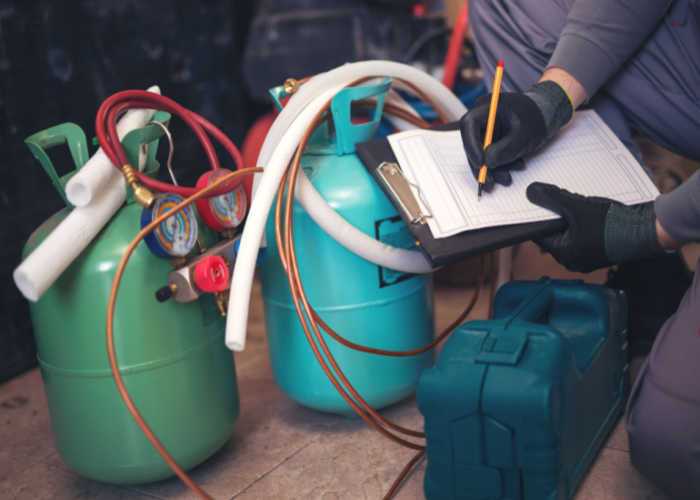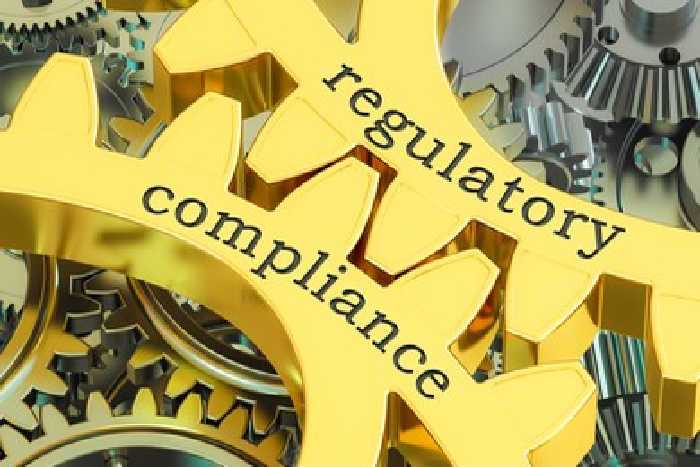If your business runs air conditioning or refrigeration systems, chances are they contain F-gases. These refrigerants are highly effective but also harmful to the environment, which is why the UK has strict F-Gas Regulations to govern their use.
But what do these rules mean for you as a business owner or facilities manager? And how do you make sure you’re meeting your legal obligations?
This guide explains what the regulations cover, how to know if your system is affected, and - most importantly - how to stay compliant.

F-gases are synthetic refrigerants like R32, R410A, and R404A. They’re widely used in commercial air conditioning systems because they’re effective for heat transfer.
The downside is that if they leak into the atmosphere, they have a much greater global warming effect than carbon dioxide.
The F-Gas Regulations first came in back in 2006, were updated in 2015, and remain in UK law after Brexit. They aim to cut the use of refrigerants with high global warming potential (GWP) and make sure the gases already in use are tightly controlled.
Put simply, the regulations cover:
One point that often causes confusion is the term “operator”. Under the regulations, the operator is the person or business that has control over how the equipment is run and maintained.
For commercial air conditioning, that usually means:
It is not the responsibility of your service provider or contractor. They can carry out the work, but the legal duty to ensure compliance rests with the operator.
Not all systems are affected, but if yours contains an HFC refrigerant (like R32 or R410A), it probably falls under F-Gas regulations.
The deciding factor is the charge size, measured in tonnes of CO₂ equivalent (tCO₂e).
You’ll usually find the refrigerant type and charge size on the equipment label. From there you can calculate the CO₂ equivalent by multiplying the charge weight (in kg) by the refrigerant’s GWP rating.
For more detail on how to calculate this and how often checks are required, see our article on F-Gas Leak Testing.
Failing to comply can lead to enforcement action and fines from the Environment Agency. But there are other risks too:
By contrast, compliance brings peace of mind, lower running costs, and more reliable systems.

This is the area most businesses need clarity on. Here’s a breakdown of what you need to do as an operator to stay compliant.
Your system must be inspected at the right intervals based on its size. These checks must be carried out by a qualified engineer using approved methods.
If your system is large, consider installing a fixed leak detection system. It reduces how often manual checks are required and alerts you quickly if there’s a problem.
Every qualifying system must have a logbook containing details such as:
These records must be kept for at least five years and be available for inspection at any time.
It’s a legal requirement that all work is carried out by certified professionals. This covers installation, servicing, maintenance, and decommissioning.
Not sure what to look for? Our post on F-Gas Certified Contractors explains the key accreditations and why they matter.
When equipment is decommissioned, the refrigerant must be recovered and either recycled, reclaimed, or destroyed. Venting it to the atmosphere is illegal.
If you’re approaching end-of-life with your system, see our guide on When, Why and How to Decommission Commercial Air Conditioning for a step-by-step overview of the process.
Compliance becomes far easier when it’s part of routine maintenance. A planned service contract will:
This takes the burden off your team and ensures nothing gets overlooked.
High-GWP refrigerants are being gradually restricted. As availability drops, prices rise. Planning ahead with system upgrades or retrofits not only keeps you compliant but also protects your budget.
The F-Gas Regulations are not static. They are part of a long-term plan to significantly reduce the use of fluorinated gases across Europe and the UK.
This is being achieved through a phase-down programme, which gradually limits the amount of F-gases that can be placed on the market each year.
In practice, this means:
For operators, the key takeaway is that refrigerants you rely on today may not be available - or may be prohibitively expensive - in the near future.
The most effective way to prepare is to start planning for alternatives.
Systems designed to run on low-GWP refrigerants, or natural options like CO₂ and hydrocarbons, are already widely available. Looking ahead, upgrading or replacing equipment before older refrigerants are fully phased out can prevent disruption and spread costs more evenly over time.
F-Gas Regulations place the responsibility firmly on the operator - the business or person in control of the equipment. That means it’s your job to make sure the rules are followed, even if a contractor is carrying out the work.
The good news is, you don’t have to manage it alone. With the right partner, compliance can become a straightforward part of your maintenance routine.
At Loughborough Air Conditioning, we help businesses across the East Midlands stay compliant with:
With over 20 years’ experience, we make compliance straightforward and stress-free.
